Jeong Kwan × Baroo Collaboration Dinner (Los Angeles, CA)
Jeongkwan Sunim × Baroo Collaboration Dinner
905 E 2nd St, Los Angeles, CA 90012
213-221-7967
www.baroolosangeles.com
Thu 08/15/2024, 08:35p-10:40p

I usually don't make it a point to check out collaborative dinners, but one that recently caught my attention was a visit by Korean temple food icon Jeong Kwan seunim (정관 스님) at Baroo. The owners of the Arts District eatery--Chef Kwang Uh and Mina Park--actually met at her hermitage back in early 2017, and Uh trained under her as well, so it made sense that she'd make her first public appearance in LA at their restaurant. In addition to the dinner I enjoyed, Jeong Kwan hosted a barugongyang meal on Saturday and taught a fermentation class on Sunday, all of which sold out from what I understand. Do also note that people were only allowed to attend one of the three events.
About the Chef: Jeong Kwan (given name: 춘정, or Chunjeong) was born in July 1956 in Yeongju, North Gyeongsang province, the fifth child (and third daughter) in a family of seven children. Her parents ran a farm, and she got interested in cooking at an early age, around six or seven, learning by watching her mother. However, her mom died when sunim was just 17. Wanting to spare any potential children of her own from such pain in the future, she decided to leave home without informing any of her family members. She made her way to a Buddhist temple, where the monks took her in, and soon found happiness and enlightenment via the practice of Seon Buddhism.
She officially became a nun two years later, and the following year, took up residence at her current home in Baegyangsa Chunjinam (백양사 천진암), located inside Naejangsan National Park. Her fellow monks taught her to cook, and she eventually decided to devote herself to the ways of Korean temple cuisine (사찰음식). In 2013, Jeong Kwan began welcoming visitors on a regular basis, and one of the earliest ones was none other than Benu's Corey Lee, who came in 2014. Upon returning to the US, he began informing others of his experience, which piqued the interest of fellow Buddhist Eric Ripert, who was so impressed by his own visit to the temple that he invited seunim to cook at Le Bernardin in early 2015.
This was a pivotal event, as it paved the way for her appearance on Chef's Table in February 2017, after which her fame quickly rose. She also began teaching at Jeonju University, and has even lectured in the US at the Culinary Institute of America and the Institute of Culinary Education in Pasadena. She started a little-known YouTube channel in 2019 (only 1.32k subscribers and 17346 views, which seems criminally low), and in 2022, was honored with the Icon Award from the folks behind Asia's 50 Best Restaurants. Last November saw the release of a cookbook entitled Jeongkwan Snim: Ihre Koreanische Tempelküche, created in collaboration with Hoo Nam Seelmann and photographer Véronique Hoegger; an English version is in work.

Pictured above is the view of the night's action from my seat the bar.
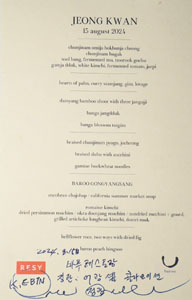
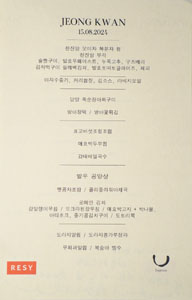
Written in both English and Korean, tonight's collaborative menu was a vegan six-courser priced at $175. Also take note of Jeong Kwan's message to me. Click for larger versions.
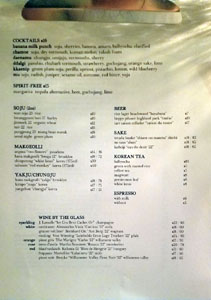
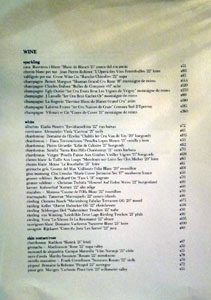
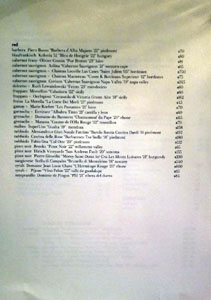
Here we see Baroo's beverage selection, which has been significantly expanded by Beverage Director Jason Lee since my last visit. Of particular note are the new cocktails and larger offering of sul. Click for larger versions.
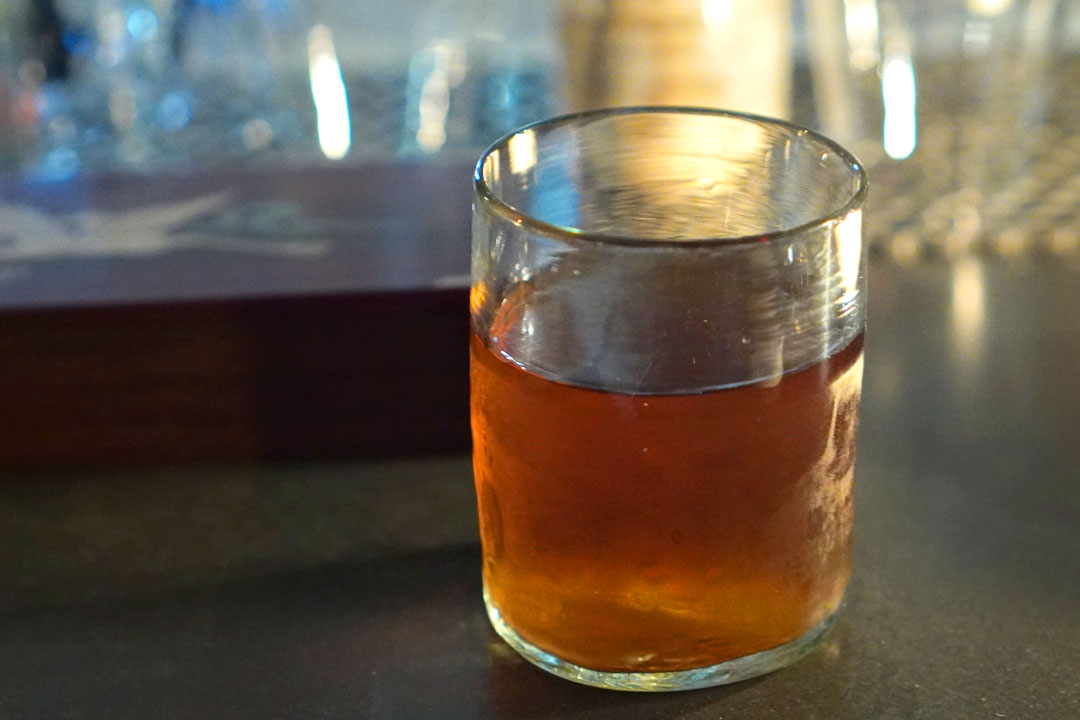
1a: chunjinam omija bokbunja cheong (천진암 오미자 복분자 청)
The meal commenced with a refreshingly cool, unexpectedly nutty serving of tea.

I was then presented with extra utensils, stored in a najeonchilgi-style box.
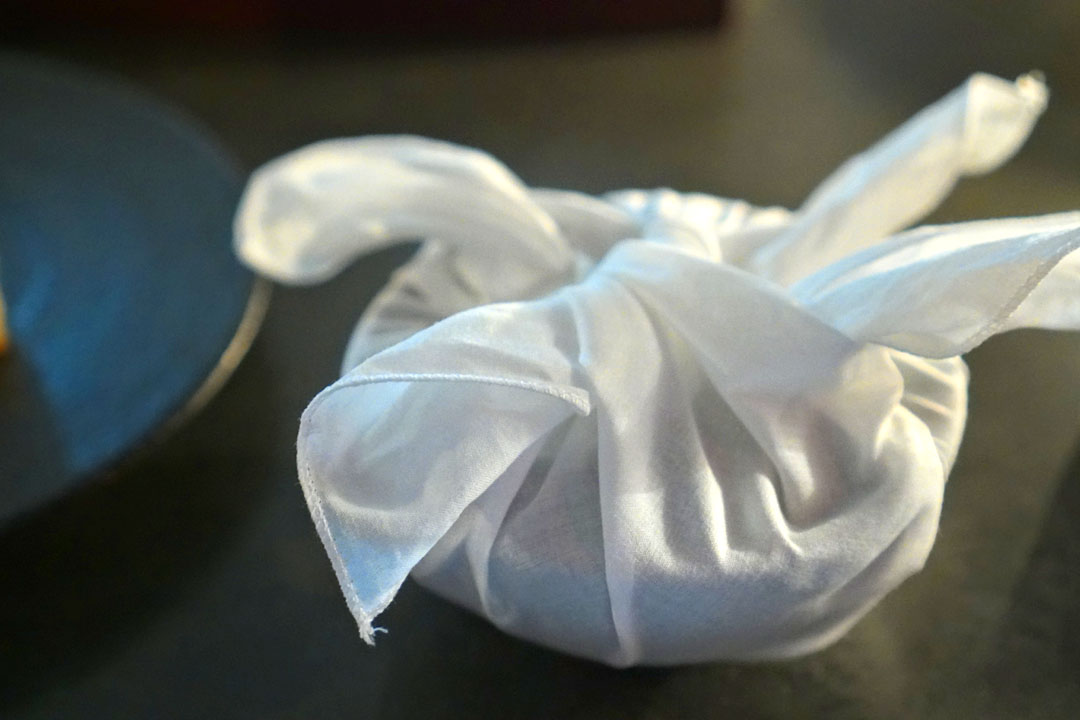
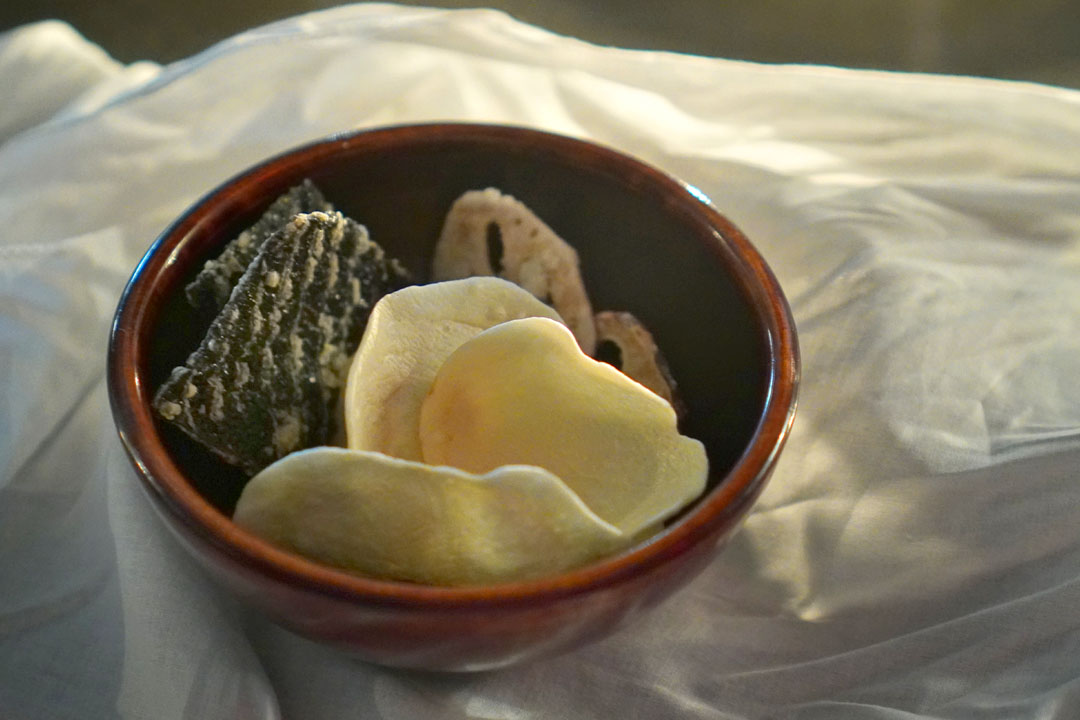
1b: chunjinam bugak (천진암 부각)
A serving of crisp-fried seaweed, lotus root, and what I believe was potato offered up an array of disparate tastes and textures, making for some apt anju to go along with my drink below.
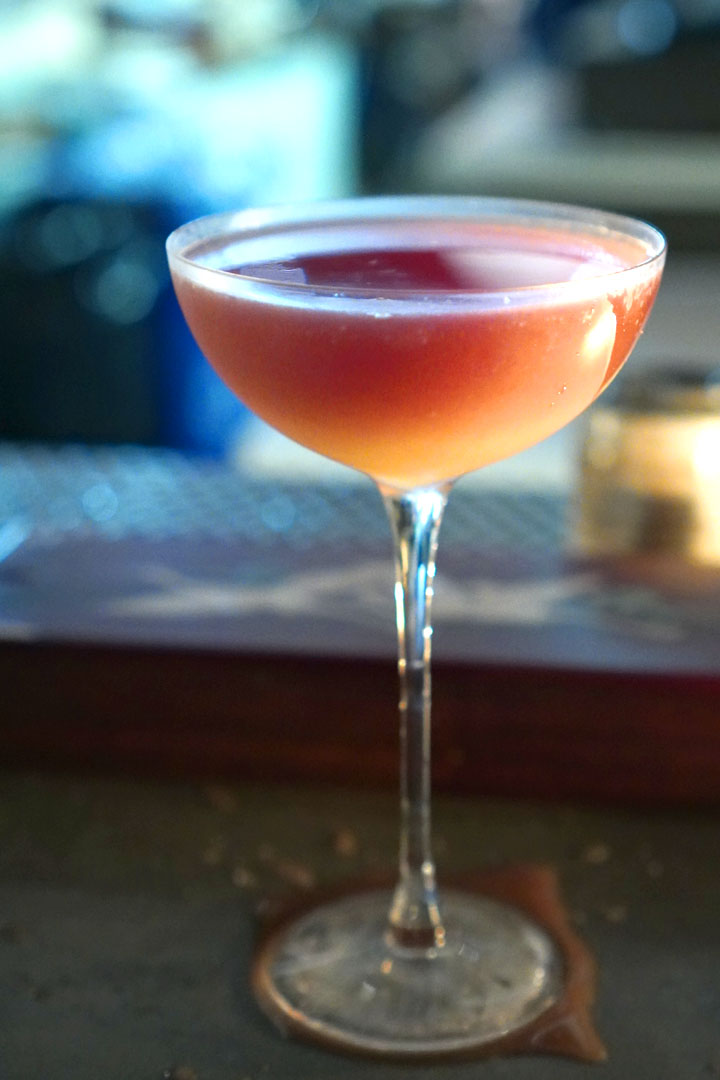
kkaenip [$16.00] | green plum soju, perilla, apricot, pistachio, lemon, wild blueberry
Despite being named after kkaenip, this first cocktail didn't really convey all that much perilla leaf, but instead was all about sweet stone fruit, backed by citrus and the kick of soju.
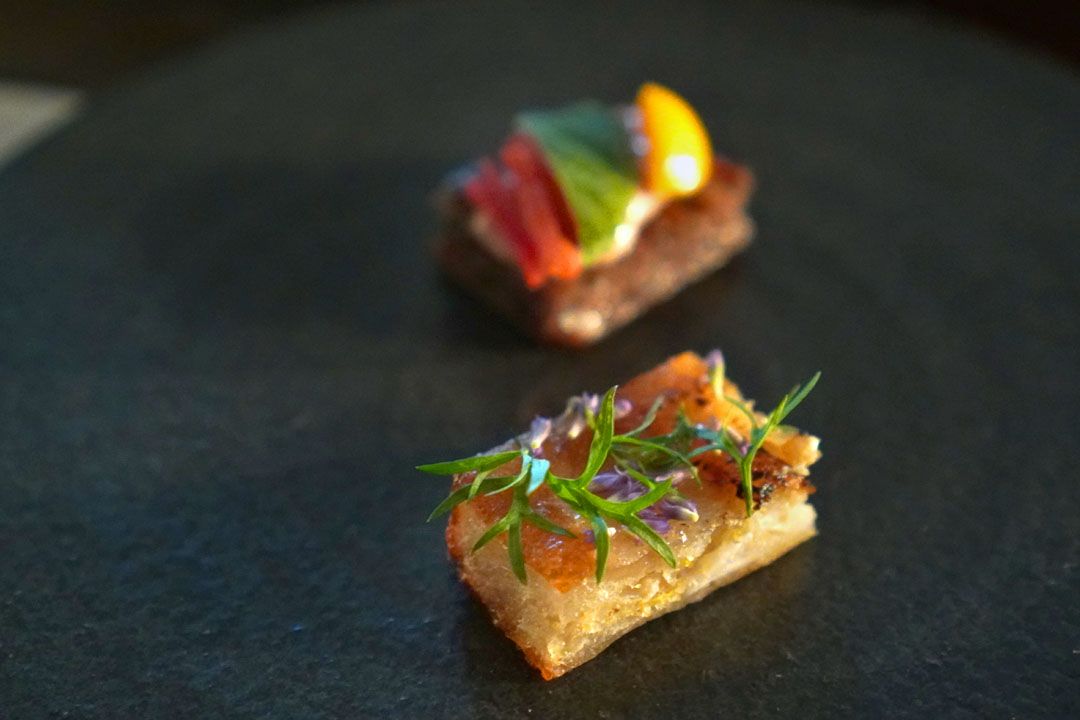
1c: sool bang, fermented mu, noorook gochu (술빵구이, 발효무페이스트, 누룩고추, 구즈베리)
Serving as a canapé of sorts, this first bite of sulbang showed off an earthy, nutty quality from the nuruk that actually reminded me of Uh's cooking at Baroo v1.0. At the same time, the herbs up top lightened the mood, and I liked the bread's rustic texture, too.
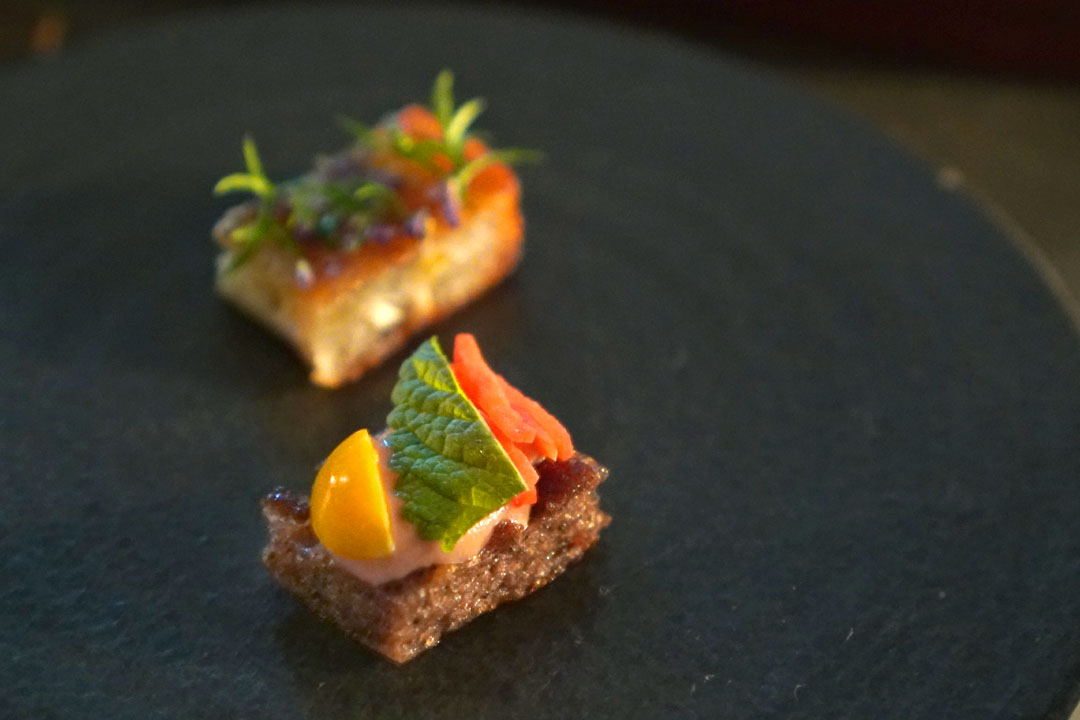
1d: gamja dduk, white kimchi, fermented tomato, jaepi (감자떡구이 들꺠백김치, 발효토마토글레이즈, 제피)
This grilled potato rice cake was an even more potent morsel. I loved the gamjatteok's dense, chewy mouthfeel and how it married with the bite's sweet, lingering heat and funk. I wouldn't have a minded a few more of these guys.
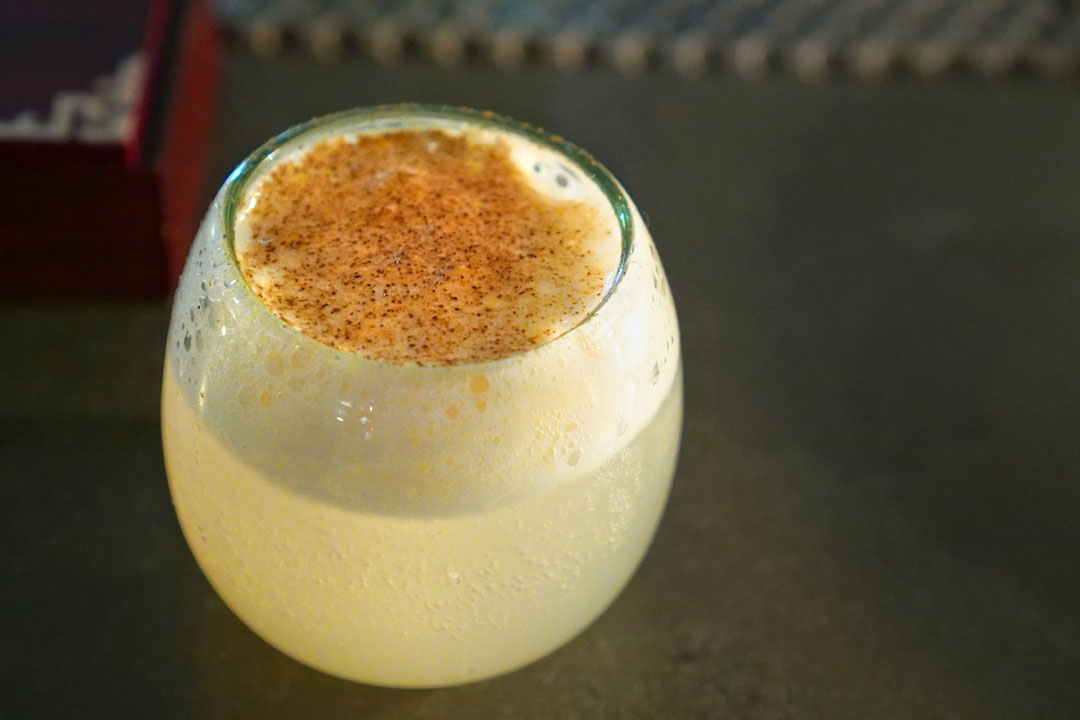
chamoe [$16.00] | soju, dry vermouth, korean melon, yakult foam
My second cocktail was soft and fluffy on the palate, and definitely highlighted the honeydew-like sugariness of the melon, offset by a slight undercurrent of astringency from the vermouth.
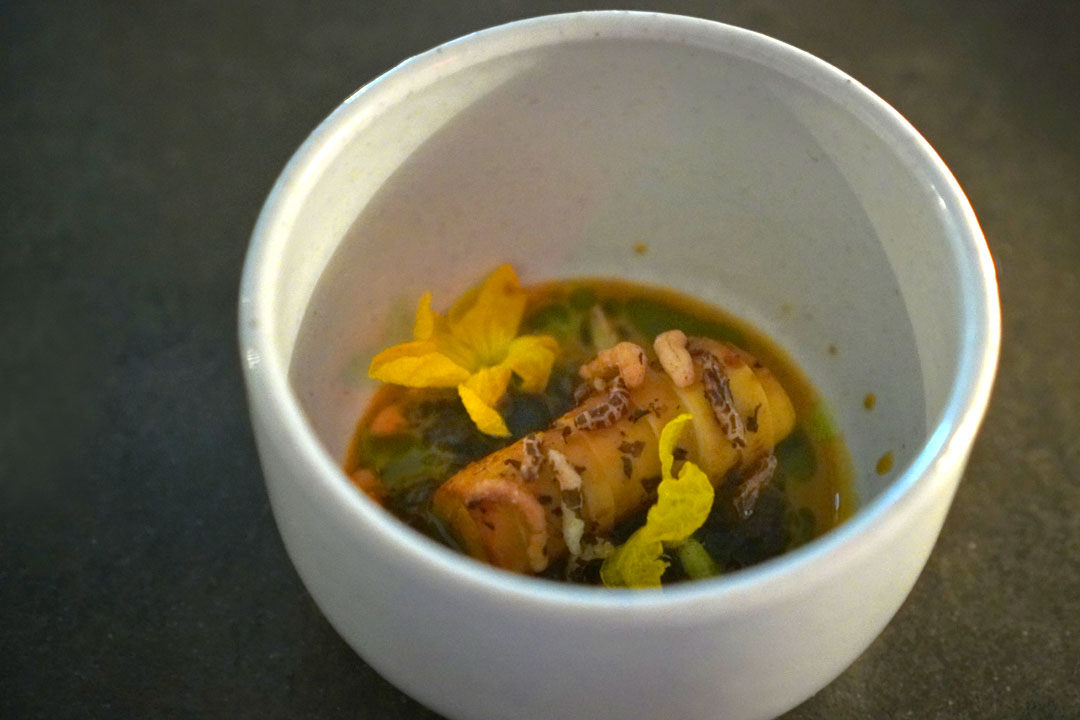
2: hearts of palm, curry ssamjang, gim, lovage (야자수줄기, 커리쌈장, 김소스, 라비지오일)
Here, yajasim showcased a fantastic smoke and crunch, and melded perfectly with the elegance of the dish's curry spices and all the nutty, funky flavors at play. I'm pretty sure that this was the best heart of palm dish I've ever had.
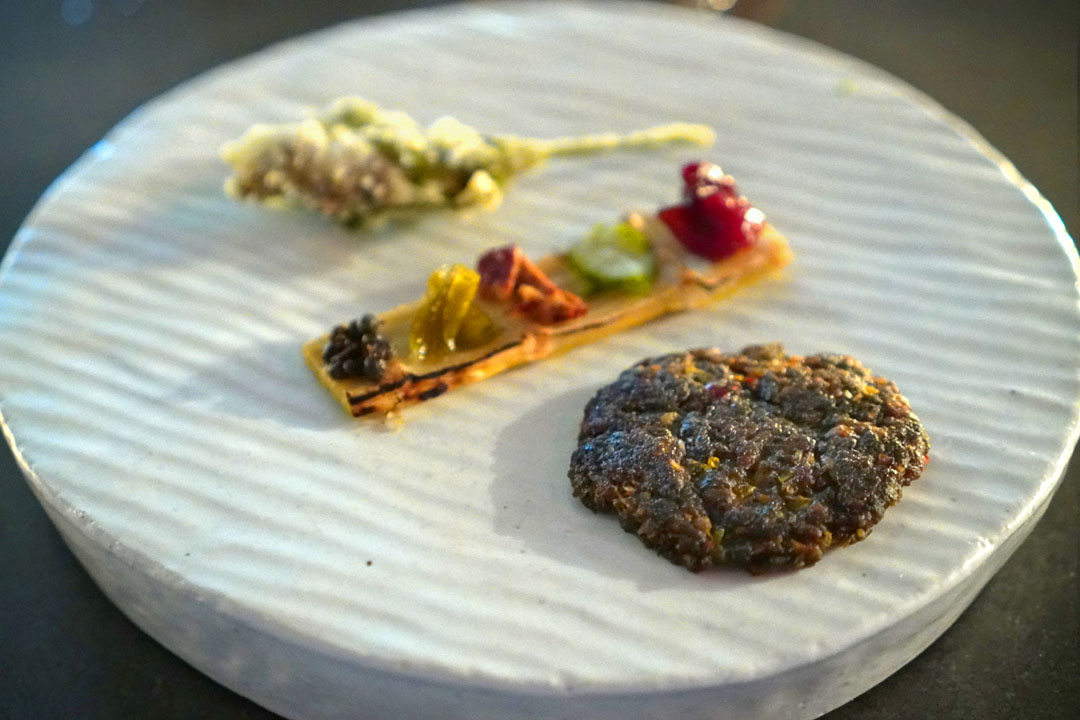
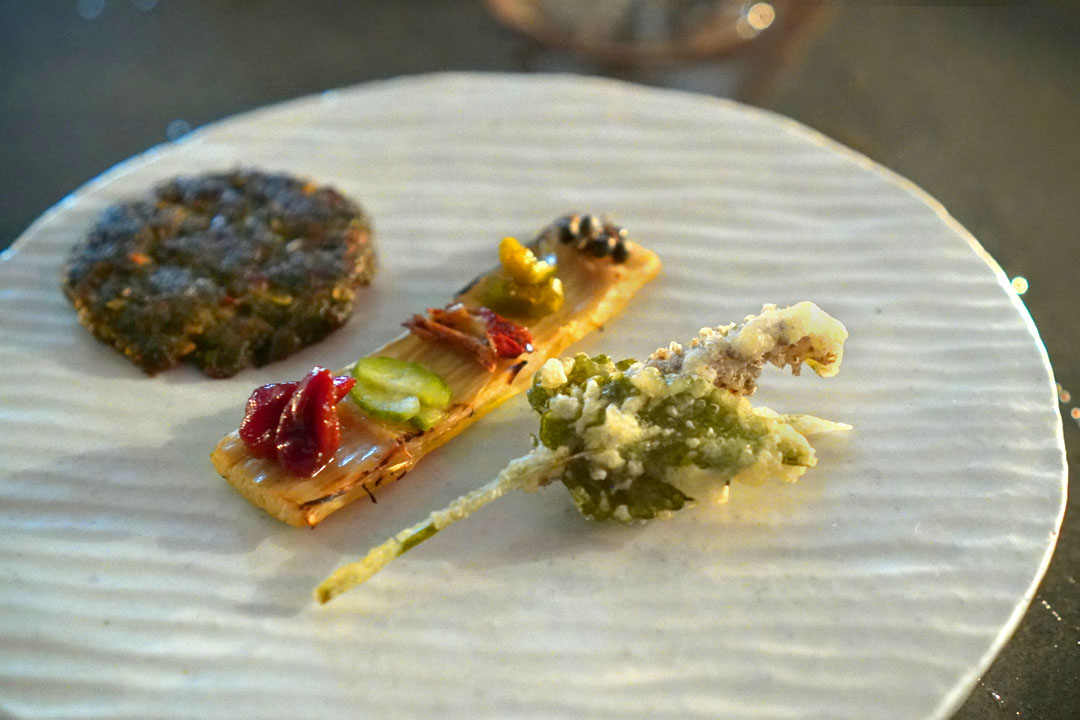
3a: damyang bamboo shoot with three jangajji (담양 죽순장아찌구이)
3b: banga jangdduk (방아장떡)
3c: banga blossom tuigim (방아꽃튀김)
Next came an intriguing three-parter course: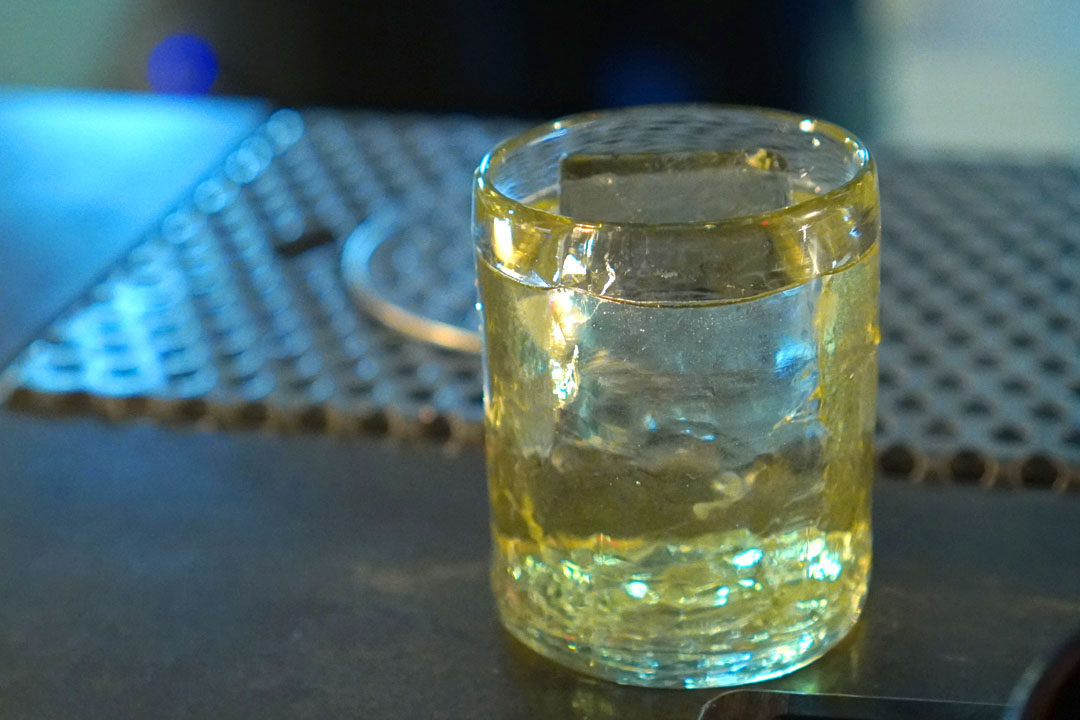
banana milk punch [$16.00] | soju, sherries, banana, amaro, balhyocha, clarified
I have a hard time resisting a clarified milk punch, so this was a must-try cocktail for me. I enjoyed its light, smooth mouthfeel and aromatic combo of tea, amaro, and sherry, but I wanted to taste more of the advertised banana.
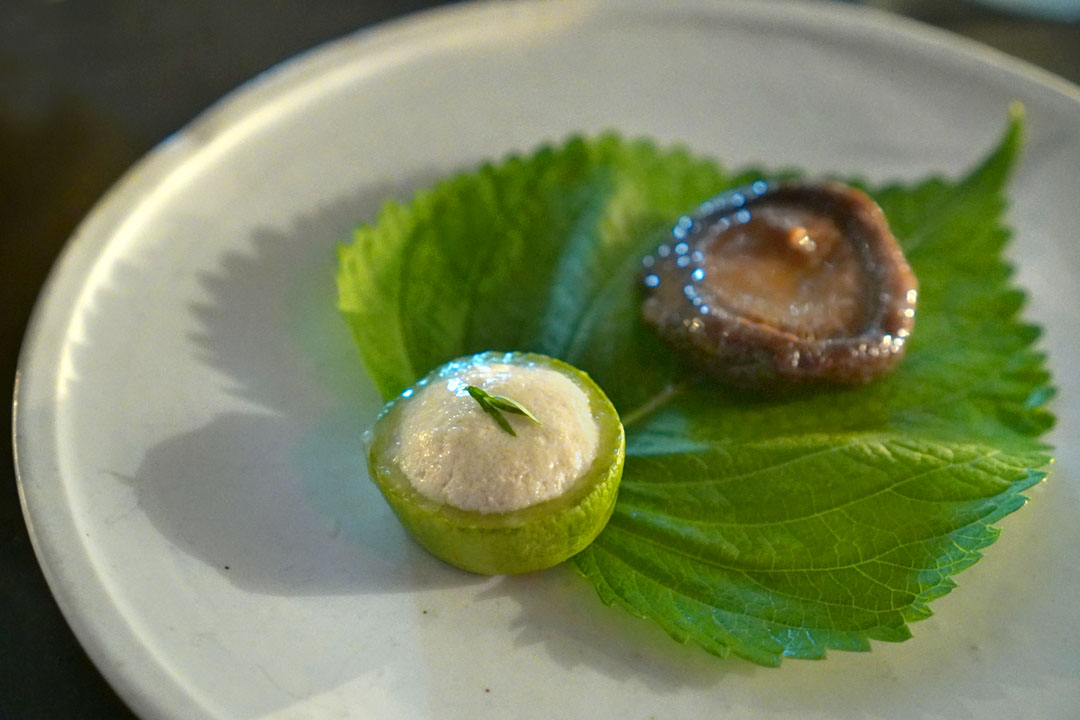
4a: braised chunjinam pyogo (표고버섯조청조림)
4b: braised dubu with zucchini (애호박두부찜)
These next two bites were served plainly on perilla. I started with a portion of the aehobak dubujjim, which featured delicately-flavored tofu surrounded by a bright, crisp ring of Korean zucchini. Even better was the stewed mushroom, which demonstrated this incredible depth and savor along with a marvelously slick, supple-yet-substantial texture. It was probably the best pyogo beoseot (i.e. shiitake) I've eaten. However, the real beauty came when I wrapped up everything in kkaenip, which allowed for a profound interplay between opposing forces of tofu and mushroom, all moderated by the minty leaf. This one wowed me.
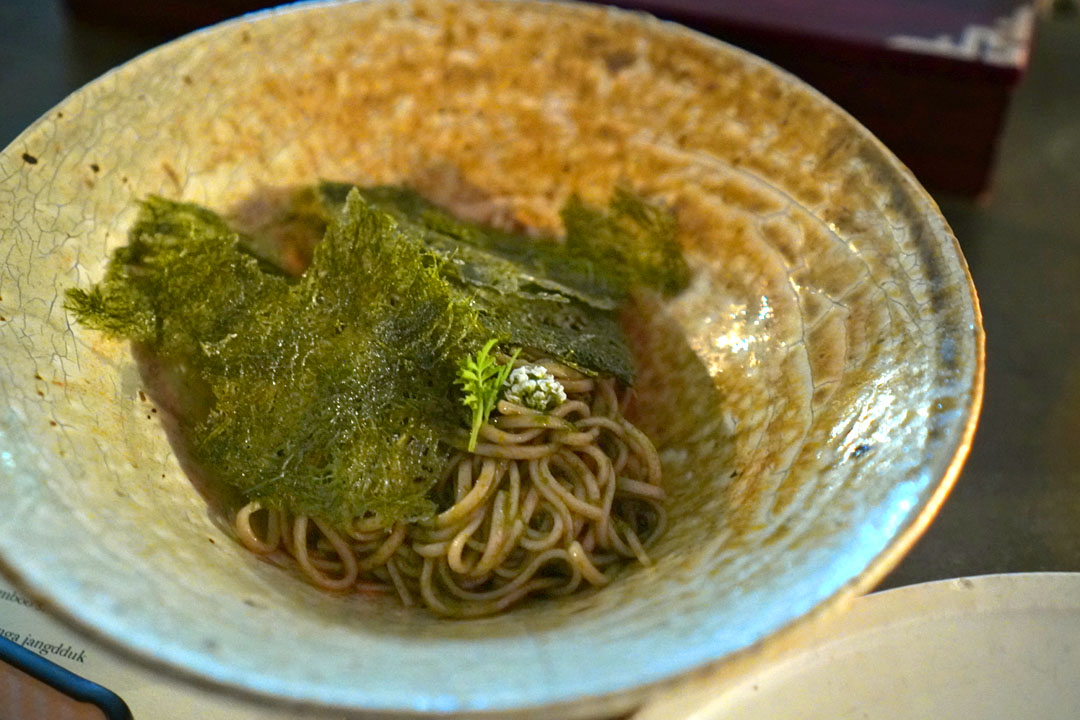
4c: gamtae buckwheat noodles (감태메밀국수)
Memil guksu had that soft, supple, but slightly chewy, slightly bouncy texture I was looking for, and paired like clockwork with a bevy of rich, savory, grassy flavors.
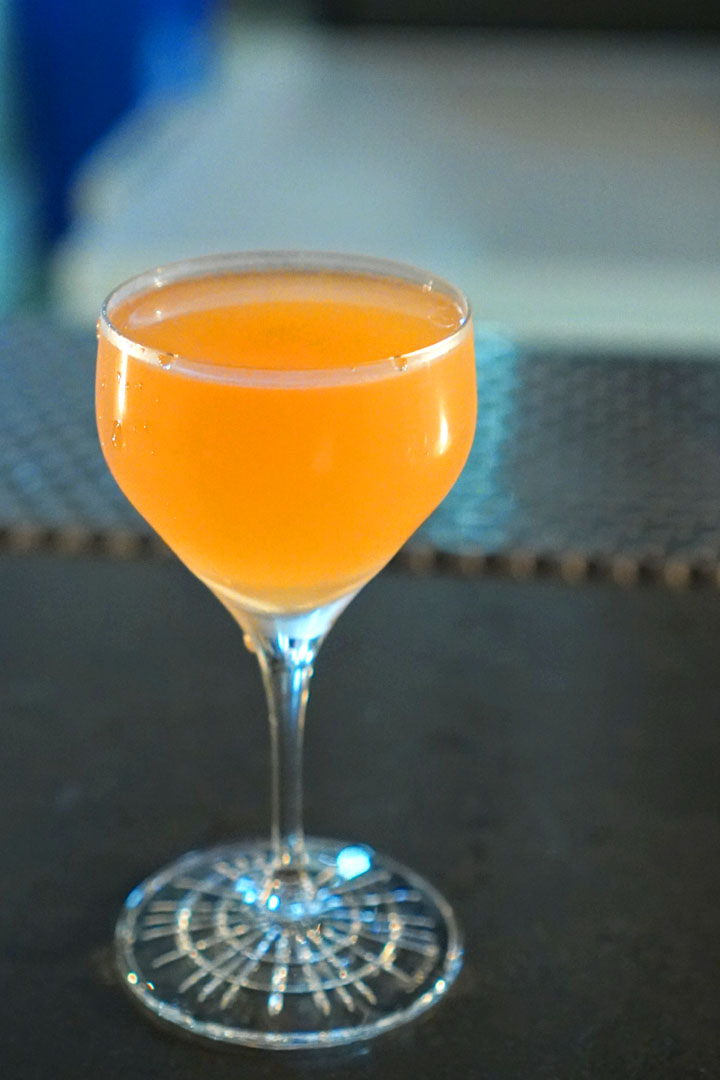
mu [$16.00] | soju, radish, juniper, sesame oil, nimome, red bitter, yuja
This cocktail came highly recommended by my bartender Jillian (ex-Ham & Eggs), and she definitely knew what she was talking about. It was my favorite of the lot, and the crux was really how it captured the savory, spicy, pungent flavors you might find in a radish kimchi. Do note that this drink and next ended up being complimentary, though I'm not sure if that was intentional or just a mistake on the staff's part.
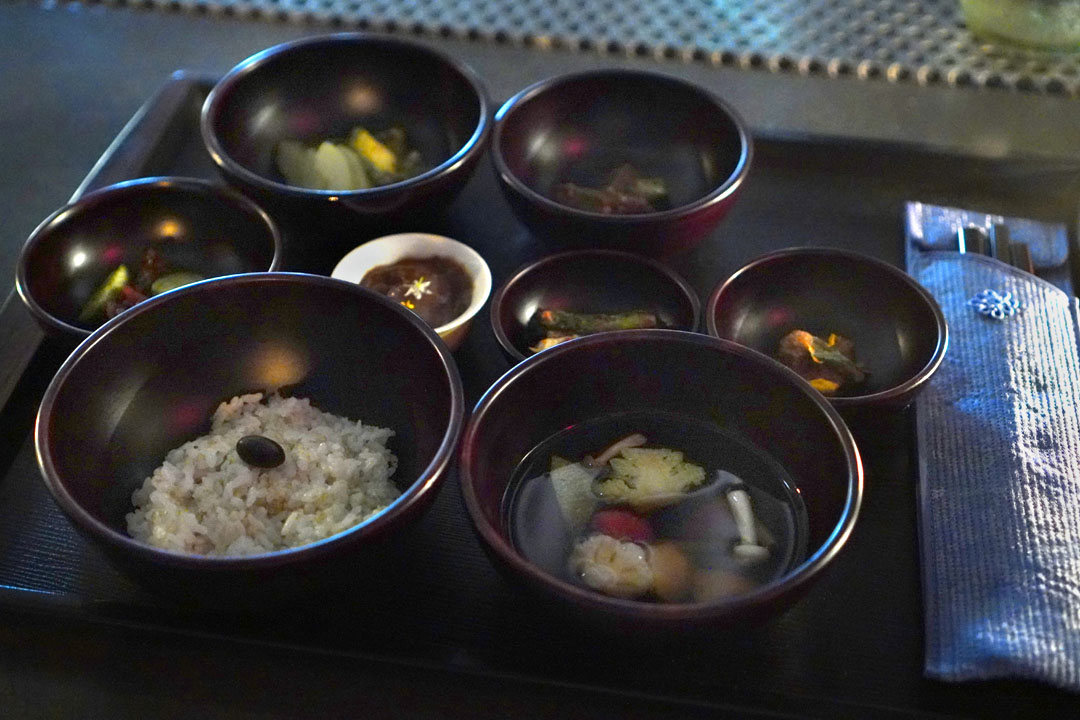
5a: cocobean chajobap (햇콩차조밥) / california summer market soup (콜리푶라워야채국)
5b: romaine kimchi (로메인 김치) / dried persimmon muchim (감말랭이무침) / okra doenjang muchim (오크라된장무침) / sundried zucchini + gourd (애호박고지 + 박나물) / grilled artichoke longbean kimchi (아티초크, 줄기콩김치구이) / dotori muk (도토리묵)
And now we come to the baru gongyangsang (발우 공양상) portion of the meal. Served in lacquered ginkgo wood bowls, the set was anchored by sticky, nutty multigrain rice and a warm, savory, seaweed-y soup incorporating farmers' market summer vegetables. Accompanying was a sextet of banchan; counter-clockwise from bottom-left: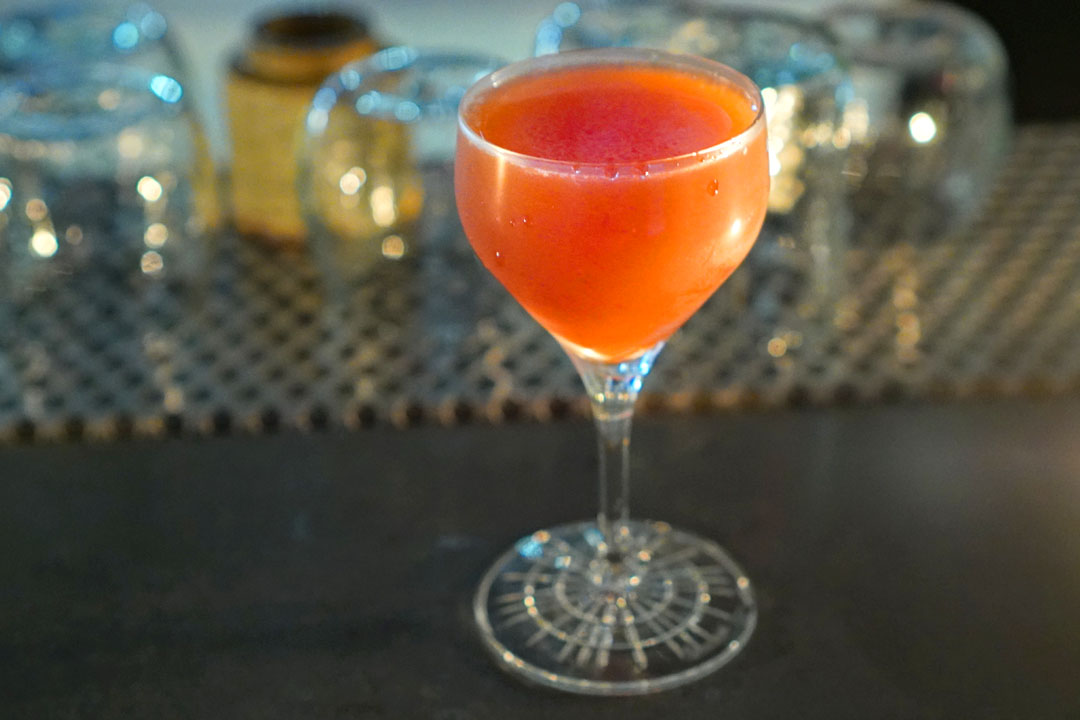
ddalgi [$16.00] | pasubio, rhubarb vermouth, strawberry, gochujang, orange sake, lime
This strawberry-themed cocktail was to my liking, conveying the sweetness of the fruit up front, but set against a boatload of tart, jammy flavors and a smidge of barnyard.
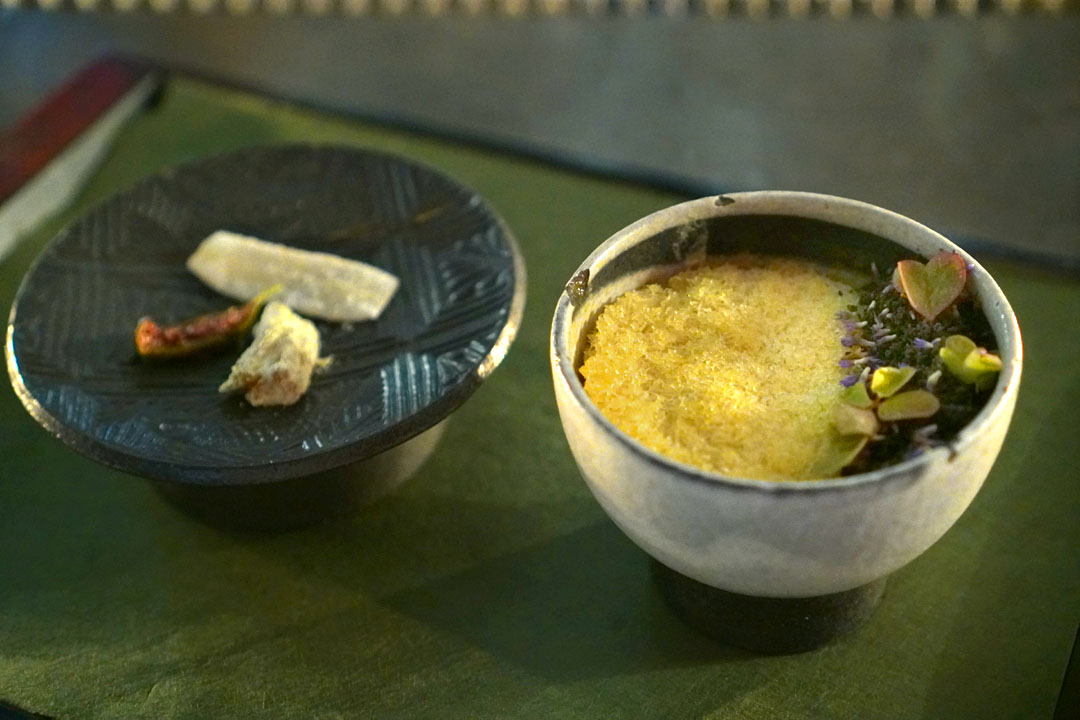
6a: bellflower root, two ways (도라지말림 / 도라지콩가루정과) with dried fig (무화과말림)
6b: baroo peach bingsoo (복숭아 빙수)
Dessert brought out a delicate peach sorbet-boosted shaved ice amped up by sweet, cereal-esque black sesame crumbles. Meanwhile, the plate on the left included a strip of lightly astringent candied doraji mallim, a more vegetal doraji konggaru jeonggwa, and sugary, sticky muhwagwa mallim, all of which deftly enhanced the bingsu.
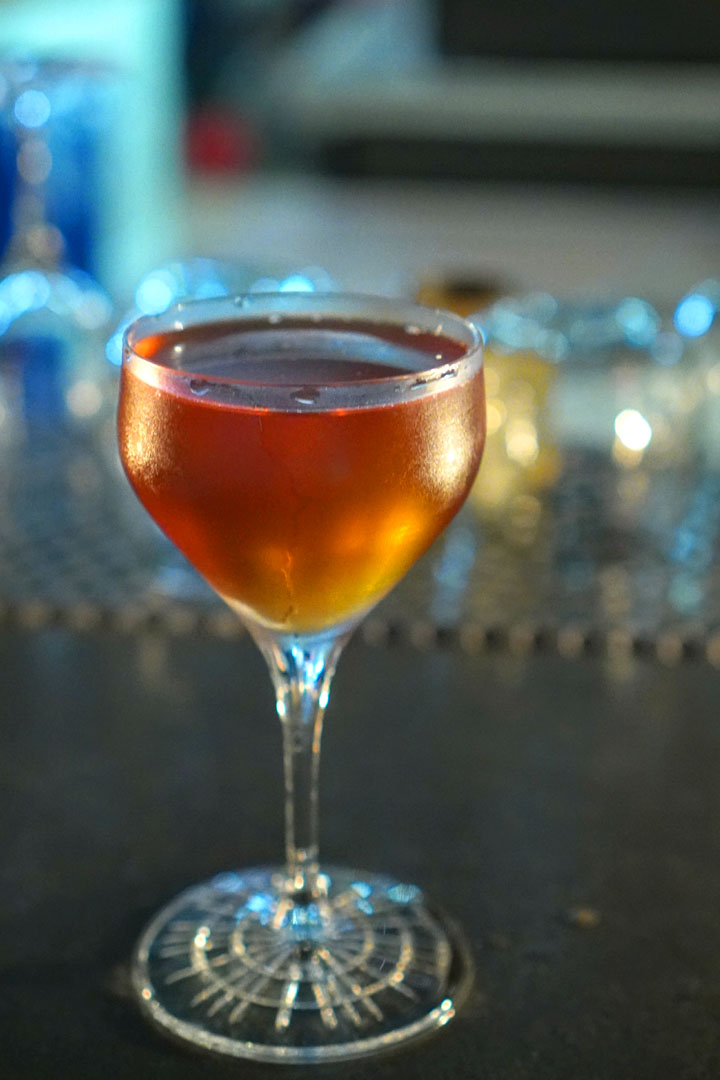
daenamu [$16.00] | chungju, omijaju, vermouths, sherry
The evening's sixth and final cocktail was also a standout due to its plethora of bittersweet, darkly fruity flavors, commingled with all of the sherry's nutty, oxidative nuances.
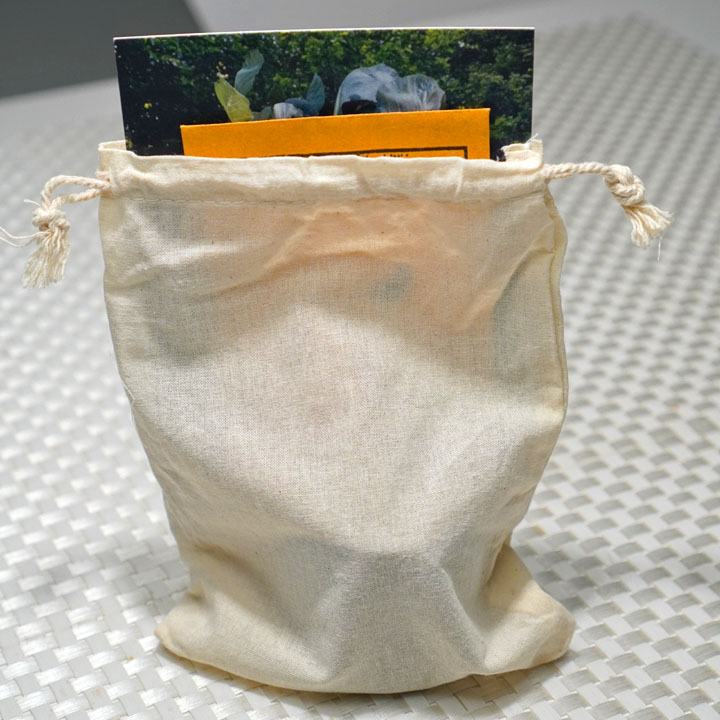
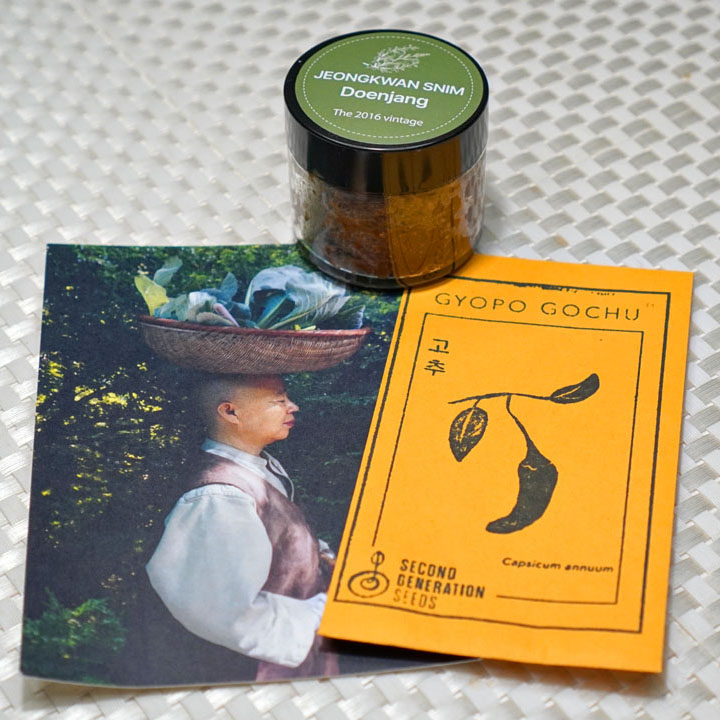
At the conclusion of the meal, I was presented with a gift bag containing a packet of chili pepper seeds, a card detailing Jeong Kwan's aforementioned cookbook, and a jar of 2016 vintage doenjang, an extra earthy preparation that was incorporated into a cozy stew some weeks later.
This was an impressive dinner, more impressive than one might think, and one of my top meals of 2024 thus far. I was a bit astonished by the depth, concentration, and gravitas that the kitchen was able to achieve tonight. Yet, at the same time, there was a palpable subtlety and yes, austerity to the cooking that all made sense. I can definitely see what all the fuss is about, and I do hope that this isn't the last that LA has seen of Jeong Kwan.
905 E 2nd St, Los Angeles, CA 90012
213-221-7967
www.baroolosangeles.com
Thu 08/15/2024, 08:35p-10:40p

I usually don't make it a point to check out collaborative dinners, but one that recently caught my attention was a visit by Korean temple food icon Jeong Kwan seunim (정관 스님) at Baroo. The owners of the Arts District eatery--Chef Kwang Uh and Mina Park--actually met at her hermitage back in early 2017, and Uh trained under her as well, so it made sense that she'd make her first public appearance in LA at their restaurant. In addition to the dinner I enjoyed, Jeong Kwan hosted a barugongyang meal on Saturday and taught a fermentation class on Sunday, all of which sold out from what I understand. Do also note that people were only allowed to attend one of the three events.
About the Chef: Jeong Kwan (given name: 춘정, or Chunjeong) was born in July 1956 in Yeongju, North Gyeongsang province, the fifth child (and third daughter) in a family of seven children. Her parents ran a farm, and she got interested in cooking at an early age, around six or seven, learning by watching her mother. However, her mom died when sunim was just 17. Wanting to spare any potential children of her own from such pain in the future, she decided to leave home without informing any of her family members. She made her way to a Buddhist temple, where the monks took her in, and soon found happiness and enlightenment via the practice of Seon Buddhism.
She officially became a nun two years later, and the following year, took up residence at her current home in Baegyangsa Chunjinam (백양사 천진암), located inside Naejangsan National Park. Her fellow monks taught her to cook, and she eventually decided to devote herself to the ways of Korean temple cuisine (사찰음식). In 2013, Jeong Kwan began welcoming visitors on a regular basis, and one of the earliest ones was none other than Benu's Corey Lee, who came in 2014. Upon returning to the US, he began informing others of his experience, which piqued the interest of fellow Buddhist Eric Ripert, who was so impressed by his own visit to the temple that he invited seunim to cook at Le Bernardin in early 2015.
This was a pivotal event, as it paved the way for her appearance on Chef's Table in February 2017, after which her fame quickly rose. She also began teaching at Jeonju University, and has even lectured in the US at the Culinary Institute of America and the Institute of Culinary Education in Pasadena. She started a little-known YouTube channel in 2019 (only 1.32k subscribers and 17346 views, which seems criminally low), and in 2022, was honored with the Icon Award from the folks behind Asia's 50 Best Restaurants. Last November saw the release of a cookbook entitled Jeongkwan Snim: Ihre Koreanische Tempelküche, created in collaboration with Hoo Nam Seelmann and photographer Véronique Hoegger; an English version is in work.

Pictured above is the view of the night's action from my seat the bar.


Written in both English and Korean, tonight's collaborative menu was a vegan six-courser priced at $175. Also take note of Jeong Kwan's message to me. Click for larger versions.



Here we see Baroo's beverage selection, which has been significantly expanded by Beverage Director Jason Lee since my last visit. Of particular note are the new cocktails and larger offering of sul. Click for larger versions.

1a: chunjinam omija bokbunja cheong (천진암 오미자 복분자 청)
The meal commenced with a refreshingly cool, unexpectedly nutty serving of tea.

I was then presented with extra utensils, stored in a najeonchilgi-style box.


1b: chunjinam bugak (천진암 부각)
A serving of crisp-fried seaweed, lotus root, and what I believe was potato offered up an array of disparate tastes and textures, making for some apt anju to go along with my drink below.

kkaenip [$16.00] | green plum soju, perilla, apricot, pistachio, lemon, wild blueberry
Despite being named after kkaenip, this first cocktail didn't really convey all that much perilla leaf, but instead was all about sweet stone fruit, backed by citrus and the kick of soju.

1c: sool bang, fermented mu, noorook gochu (술빵구이, 발효무페이스트, 누룩고추, 구즈베리)
Serving as a canapé of sorts, this first bite of sulbang showed off an earthy, nutty quality from the nuruk that actually reminded me of Uh's cooking at Baroo v1.0. At the same time, the herbs up top lightened the mood, and I liked the bread's rustic texture, too.

1d: gamja dduk, white kimchi, fermented tomato, jaepi (감자떡구이 들꺠백김치, 발효토마토글레이즈, 제피)
This grilled potato rice cake was an even more potent morsel. I loved the gamjatteok's dense, chewy mouthfeel and how it married with the bite's sweet, lingering heat and funk. I wouldn't have a minded a few more of these guys.

chamoe [$16.00] | soju, dry vermouth, korean melon, yakult foam
My second cocktail was soft and fluffy on the palate, and definitely highlighted the honeydew-like sugariness of the melon, offset by a slight undercurrent of astringency from the vermouth.

2: hearts of palm, curry ssamjang, gim, lovage (야자수줄기, 커리쌈장, 김소스, 라비지오일)
Here, yajasim showcased a fantastic smoke and crunch, and melded perfectly with the elegance of the dish's curry spices and all the nutty, funky flavors at play. I'm pretty sure that this was the best heart of palm dish I've ever had.


3a: damyang bamboo shoot with three jangajji (담양 죽순장아찌구이)
3b: banga jangdduk (방아장떡)
3c: banga blossom tuigim (방아꽃튀김)
Next came an intriguing three-parter course:
- I began with the bangajangtteok, a savory, homey pancake incorporating both fermented soybeans and chilies.
- In the middle was grilled pickled bamboo from Damyang, crowned with five different accompaniments, which I enjoyed one-by-one by cutting the shoot into five pieces: a delightfully zingy, prickly, pickled sancho with a nearly "cooling" spice; pickled maesil (green plum), which had an earthy sweetness; dried red dates (daechu) with a familiar funk; refreshingly tangy cucumelon; and finally, an invigorating, zesty, wonderfully barnyard-y pickled tomato.
- Last up was the bangakkot twigim, the crunchy, substantially-textured, surprisingly sweet deep-fried flowers of the Korean mint plant.

banana milk punch [$16.00] | soju, sherries, banana, amaro, balhyocha, clarified
I have a hard time resisting a clarified milk punch, so this was a must-try cocktail for me. I enjoyed its light, smooth mouthfeel and aromatic combo of tea, amaro, and sherry, but I wanted to taste more of the advertised banana.

4a: braised chunjinam pyogo (표고버섯조청조림)
4b: braised dubu with zucchini (애호박두부찜)
These next two bites were served plainly on perilla. I started with a portion of the aehobak dubujjim, which featured delicately-flavored tofu surrounded by a bright, crisp ring of Korean zucchini. Even better was the stewed mushroom, which demonstrated this incredible depth and savor along with a marvelously slick, supple-yet-substantial texture. It was probably the best pyogo beoseot (i.e. shiitake) I've eaten. However, the real beauty came when I wrapped up everything in kkaenip, which allowed for a profound interplay between opposing forces of tofu and mushroom, all moderated by the minty leaf. This one wowed me.

4c: gamtae buckwheat noodles (감태메밀국수)
Memil guksu had that soft, supple, but slightly chewy, slightly bouncy texture I was looking for, and paired like clockwork with a bevy of rich, savory, grassy flavors.

mu [$16.00] | soju, radish, juniper, sesame oil, nimome, red bitter, yuja
This cocktail came highly recommended by my bartender Jillian (ex-Ham & Eggs), and she definitely knew what she was talking about. It was my favorite of the lot, and the crux was really how it captured the savory, spicy, pungent flavors you might find in a radish kimchi. Do note that this drink and next ended up being complimentary, though I'm not sure if that was intentional or just a mistake on the staff's part.

5a: cocobean chajobap (햇콩차조밥) / california summer market soup (콜리푶라워야채국)
5b: romaine kimchi (로메인 김치) / dried persimmon muchim (감말랭이무침) / okra doenjang muchim (오크라된장무침) / sundried zucchini + gourd (애호박고지 + 박나물) / grilled artichoke longbean kimchi (아티초크, 줄기콩김치구이) / dotori muk (도토리묵)
And now we come to the baru gongyangsang (발우 공양상) portion of the meal. Served in lacquered ginkgo wood bowls, the set was anchored by sticky, nutty multigrain rice and a warm, savory, seaweed-y soup incorporating farmers' market summer vegetables. Accompanying was a sextet of banchan; counter-clockwise from bottom-left:
- Gammallaengi (dried persimmons) were sticky and pickley, and set against brighter, crunchier cuts of cucumelon.
- The dotorimuk (acorn jelly) was on point texturally, and had a zippiness to it that I didn't expect.
- A crisp kimchi made from romaine lettuce was somewhat milder than most.
- Another kimchi was composed of grilled artichoke and long bean, and displayed crunch, funk, and a surprising "peach-y" sweetness.
- Cuts of calabash ate light and bright, matching up well with the stronger flavors of sun-dried aehobak.
- The okra was my favorite of the banchan thanks to its mouthwatering spice, mucilaginous consistency, and ginger-like pungency.

ddalgi [$16.00] | pasubio, rhubarb vermouth, strawberry, gochujang, orange sake, lime
This strawberry-themed cocktail was to my liking, conveying the sweetness of the fruit up front, but set against a boatload of tart, jammy flavors and a smidge of barnyard.

6a: bellflower root, two ways (도라지말림 / 도라지콩가루정과) with dried fig (무화과말림)
6b: baroo peach bingsoo (복숭아 빙수)
Dessert brought out a delicate peach sorbet-boosted shaved ice amped up by sweet, cereal-esque black sesame crumbles. Meanwhile, the plate on the left included a strip of lightly astringent candied doraji mallim, a more vegetal doraji konggaru jeonggwa, and sugary, sticky muhwagwa mallim, all of which deftly enhanced the bingsu.

daenamu [$16.00] | chungju, omijaju, vermouths, sherry
The evening's sixth and final cocktail was also a standout due to its plethora of bittersweet, darkly fruity flavors, commingled with all of the sherry's nutty, oxidative nuances.


At the conclusion of the meal, I was presented with a gift bag containing a packet of chili pepper seeds, a card detailing Jeong Kwan's aforementioned cookbook, and a jar of 2016 vintage doenjang, an extra earthy preparation that was incorporated into a cozy stew some weeks later.
This was an impressive dinner, more impressive than one might think, and one of my top meals of 2024 thus far. I was a bit astonished by the depth, concentration, and gravitas that the kitchen was able to achieve tonight. Yet, at the same time, there was a palpable subtlety and yes, austerity to the cooking that all made sense. I can definitely see what all the fuss is about, and I do hope that this isn't the last that LA has seen of Jeong Kwan.
6 Comments:
Omg.. I am so unbelievably jealous. I cried when I saw her netflix special. How did you find out about the event??
If I recall correctly, news about the event came up on my Instagram feed. ;)
I've been following your blog for years now, and have always been a fan. I actually sat right next to you that night for this event. It crossed my mind briefly that it might have been you, but I didn't get a chance to ask.
Pretty crazy to finally cross paths after all these years! It was really great to meeting. Hopefully that instance won't be the last 🙂
Oh wow, small world! Now I'm wondering, were you on my my left or right?
I was on your left! We spoke briefly about how you just came back from SingleThread and how Jon Yao was in the house that night. We talked a bit about Seline and Somni opening up, so maybe I'll run into you there too :)
Ah yes, I certainly remember that. Actually, now that you mention it, I do need to look into reservations for Seline/Somni. And on a related note, here's my post on SingleThread. ;)
Post a Comment
Subscribe to Post Comments [Atom]
<< Home